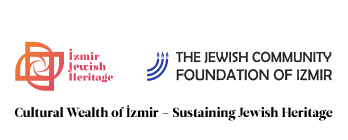Izmir has evolved over thousands of years under the influence of various cultures, and this cultural diversity has been a significant element enriching our city. The Jewish culture in Izmir is an indispensable part of this diversity. The preservation and transmission of this precious heritage to future generations can only be possible through our joint efforts.
With this manifesto, as a community united in the mission of preserving the Jewish cultural heritage in our city, we emphasize the importance of cultural diversity and believe in the power of dialogue in the fight against discrimination. We are committed to implementing and developing this manifesto to ensure the ongoing existence of the Jewish cultural heritage as an integral part of both our city’s and the world’s cultural heritage.
1. We believe that ensuring broad participation in decision-making processes will lead to more equitable and sustainable outcomes for the future of cultural heritage. Within this context:
- The participation of the Jewish community, the primary stakeholder of the Jewish cultural heritage, and the Jewish Community Foundation of Izmir as its representative, in the processes of heritage protection, management, and promotion should become more effective. This aims to better reflect their knowledge, experience, expectations, and demands in planning and decision-making processes.
- An interdisciplinary scientific advisory board should be established specifically for Jewish heritage within the management of the The Historical Port City of Izmir.
- Working groups and committees for the city’s cultural projects should be formed to facilitate in-depth participation of community members; periodic reporting should be conducted to ensure the monitoring of the activities.
- Volunteer programs in culture and conservation projects should be created to enable direct participation of the community and to enhance a sense of ownership.
2. We believe in the importance of celebrating cultural diversity and promoting dialogue against discrimination. Within this context:
- Education and awareness programs about the city’s cultural heritage, as well as trainings to combat discrimination should be organized, especially for employees of public institutions, to enhance dialogue and understanding.
- The efforts for the synagogues compound in the Old Jewish Quarter to be recognized as a cultural heritage, tourism, and intercultural dialogue center in Turkey and worldwide should be supported by local authorities.
- The organization of festivals and events aimed at conveying the Jewish cultural heritage in Izmir and celebrating intercultural interaction should be supported.
- Open forums that bring the community together in the campaign against discrimination should be organized.
- Intercultural dialogue and research studies should be conducted.
- Workshop activities for children and young people in educational institutions should be implemented to combat discrimination.
3. We support the effective implementation of awareness and consciousness-raising activities in society. Within this context:
- Educational seminars and workshops should be organized on the multicultural structure of Izmir from past to present, and the role of Izmir’s Jewish community in the city’s historical development.
- Conferences, panels, and similar events focusing on Jewish culture should be organized to bring together experts, decision-makers, and city residents.
- The Jewish heritage route should be integrated into tour routes and promotional materials conducted by culture-tourism stakeholders, including local municipalities.
- Visual elements should be placed in key locations of the city to make the Jewish cultural heritage in Izmir more visible and accessible to a wider audience.
- Informative activities about the reflections of multicultural life on the bazaar throughout history, including the Jewish cultural heritage within this framework, should be conducted for the tradespeople of Kemeraltı Bazaar from a cultural tourism perspective.
4. We believe in the importance of promoting collaboration and dialogue in the preservation of heritage. Within this context:
- Academic research and joint studies should be developed by collaborating with university departments, such as, archaeology, architecture, history, art history, cinema, television and visual communication.
- Joint projects should be developed in collaboration with NGOs, municipalities, and other local government units in the city for conservation, restoration works, and creating awareness.
- A communication platform should be established to deepen and diversify dialogue with civil society and the private sector to develop joint projects.
5. Conservation and restoration efforts are indispensable elements of this endeavor. Within this context:
- The continuation of restoration projects aimed at preserving historical structures such as the rabbinate building, the synagogues, and the kortijos should be supported by local authorities and civil society.
- Applications should be made to local, national, and international funds to provide financing for restoration works, and fundraising campaigns should be organized.
- Conservation plans and risk assessments for heritage structures should be conducted, and precautions should be taken against potential risks.
- Old manuscripts and documents related to Jewish culture should be archived digitally.
- Workshops and training sessions should be organized to keep the Ladino language, music, culinary culture, and Jewish traditional handicrafts alive.
6. We wish to highlight the importance of effectively utilizing the power of culture and art. In this context:
- Culture and art festivals reaching a wide audience, should be organized to celebrate, preserve, and increase the visibility of Jewish culture.
- Jewish culture should also be featured in international culture and art festivals organized in Izmir.
- Support should be provided to ensure that heritage structures host cultural and artistic events that bring together the community and all city residents.
- To preserve Jewish literature and writing tradition, workshops should be organized, and authors and literary works should be introduced.
7. Inclusion in the city’s strategic documents is important as it demonstrates a commitment to heritage preservation. Within this context:
- A strategy for the sustainable management of the Jewish cultural heritage in Izmir should be developed, and this strategy should be integrated into the city’s cultural strategies, particularly the strategic plan prepared by the Izmir Metropolitan Municipality and the Regional Development Plan prepared by the Izmir Development Agency.
8. We believe that preservation will be more effectively conducted with the perspective and support gained from international collaboration. In this context:
- Jewish cultural heritage should be included as one of the cultural components of Izmir in international platforms where the city’s culture and tourisms sectors are represented.
- Collaboration with international museums and cultural institutions should be developed.
- Collaboration with international academic institutions should be established to contribute to research and documentation projects, and to ensure information sharing.
- Jewish heritage should also be included in international workshops, seminars, and similar events, in the filed of cultural heritage, organized in the city.
- Projects focusing on Jewish heritage should be developed within the framework of international cultural funds coordinated by local municipalities.

